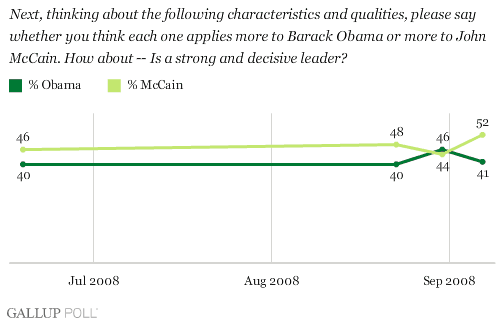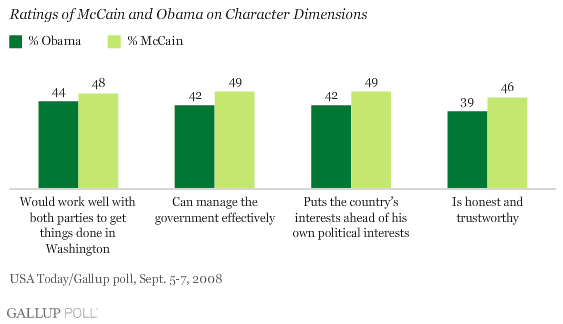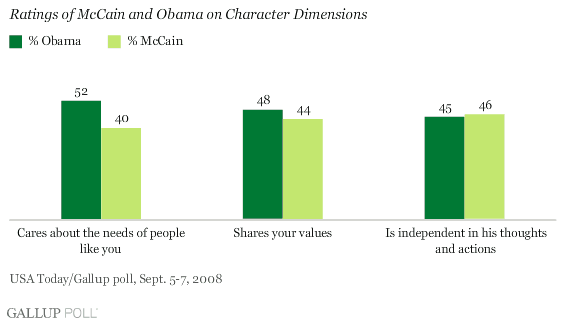PRINCETON, NJ -- After a Republican National Convention that saw him take the lead over Barack Obama in national trial-heat polls, John McCain is once again perceived as superior to Obama in terms of being a strong and decisive leader.

Obama had erased McCain's former advantage on the leadership dimension after the Democratic National Convention, but now McCain has regained the advantage. McCain has a larger advantage over Obama on leadership than on any of the other eight character dimensions tested in the Sept. 5-7 USA Today/Gallup poll. He also leads Obama in terms of being honest and trustworthy, putting the country's interests ahead of his own political interests, being able to manage the government effectively, and being able to work with both parties to get things done in Washington.

Obama's strengths compared with McCain's this year have been on matters dealing with empathy -- the public gives the Democratic nominee the edge when asked which presidential candidate "cares about the needs of people like you" and "shares your values." The public is evenly divided as to which candidate is more "independent in his thoughts and actions," something McCain tried to emphasize during his acceptance speech.

Obama has led McCain throughout the campaign on the two caring dimensions, but his margin on both was reduced after the GOP convention, from a 20-point advantage on "cares about the needs of people like you" to 12 points, and from a 13-point advantage on "shares your values" down to 4 points.
It is not unusual for the public's perceptions of the candidates to shift after each is cast in a warm glow at his party's nominating convention. John Kerry gained on George W. Bush on each of eight comparative character ratings asked before and after the 2004 Democratic convention, while Bush gained on five of six dimensions asked before and after the 2004 Republican convention. Bush also saw gains an all nine quality ratings asked after the 2000 Republican convention, while Al Gore's ratings improved on the same nine ratings after the 2000 Democratic convention. In fact, in that year, the public rated Bush as better than Gore on all nine dimensions after the Republican convention, but then shifted to rate Gore as better than Bush on eight of the nine dimensions after the Democratic convention.
Usually, the public's assessments return to more typical levels once the campaign moves forward from the conventions. Thus, McCain's stronger positioning on these dimensions in the current poll is likely to recede in the coming weeks.
Notwithstanding any short-term movement tied to the party conventions, there seem to be well-established party stereotypes influencing how voters rate the candidates on these comparative character items. The most common are to rate the Democratic candidate as better on caring about people's needs, and the Republican candidate as superior on leadership. Democrats Bill Clinton (1996), Gore (2000), Kerry (2004), and Obama have all been viewed as better than their respective Republican opponents on caring about people for most of their presidential campaigns, while Republicans George W. Bush (2000 and 2004) and McCain have usually been perceived as stronger leaders than their Democratic rivals. Thus, Obama's advantage on empathy and McCain's on leadership may reflect party stereotypes in addition to a basic assessment of each individual's relative merits on each dimension.
Survey Methods
Results are based on telephone interviews with 1,022 national adults, aged 18 and older, conducted Sept. 5-7, 2008. For results based on the total sample of national adults, one can say with 95% confidence that the maximum margin of sampling error is ±3 percentage points.
Interviews are conducted with respondents on land-line telephones (for respondents with a land-line telephone) and cellular phones (for respondents who are cell-phone only).
In addition to sampling error, question wording and practical difficulties in conducting surveys can introduce error or bias into the findings of public opinion polls.
To provide feedback or suggestions about how to improve Gallup.com, please e-mail feedback@gallup.com.
